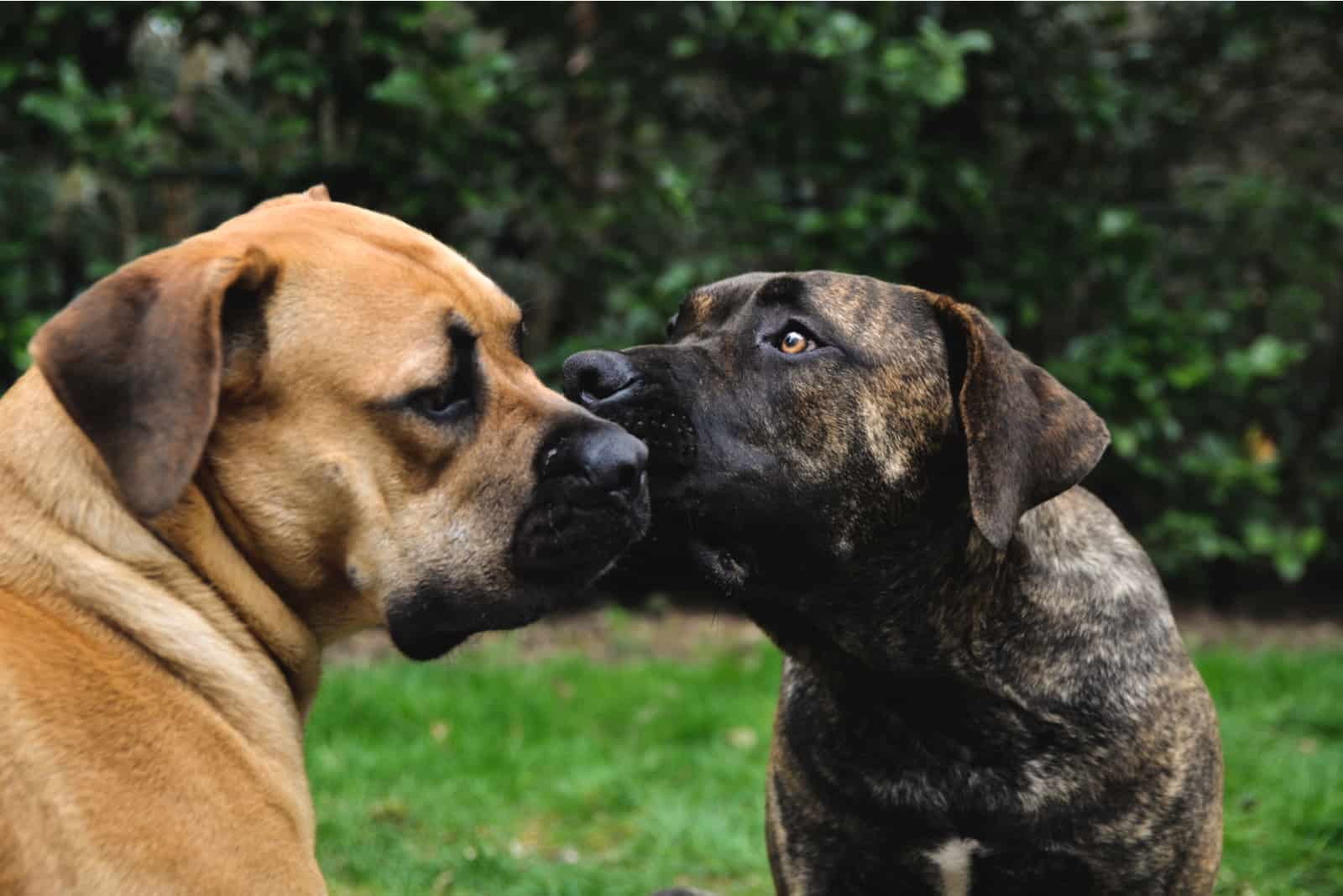As dog lovers, we know that our pooches can act strangely at times. At least, their behavior seems bizarre to us because we wouldn’t dream of doing some of the stuff they do!
This includes ear licking. You might have been wondering, why is my dog licking my other dog’s ears? If so, we’re here to help.
We’re exploring the possible reasons for this behavior as there is more than one answer to the question, Why do dogs lick other dogs’ ears?
Why Do Dogs Lick Each Other’s Faces And Ears?
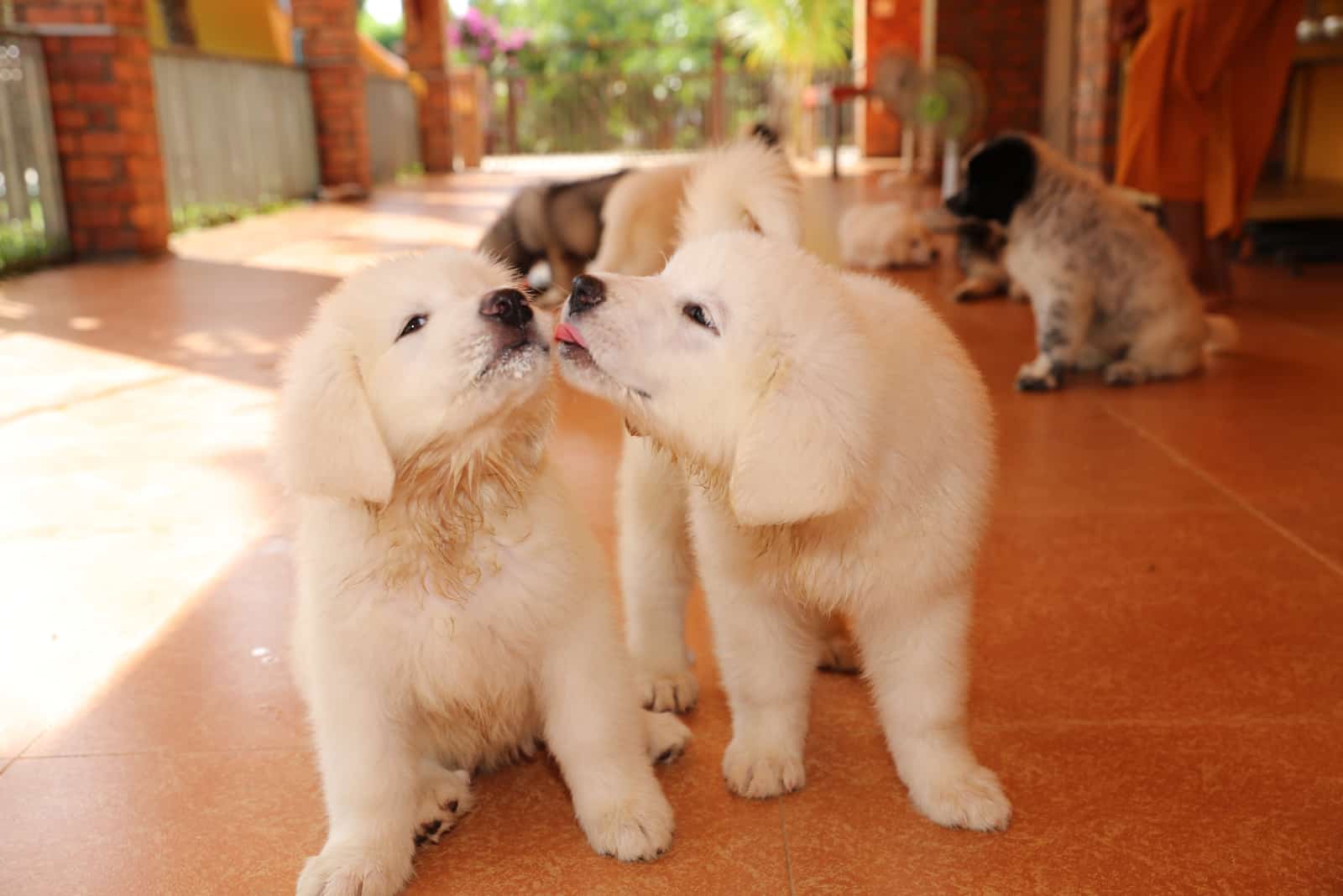
It could be a way of saying, Hi!
Dogs are highly social pack animals and thrive on being part of a community. You, or someone in your household, are most likely the pack leader. In the wild, there’s a hierarchy among dogs, and each animal will greet others according to its status. Aside from the usual round of butt-sniffing, they also utter growls and barks, and they will often lick each other’s faces and ears.
Humans also have various customs and behaviors that we use according to how well we know people or the occasion. Thankfully, they are very different from the ones that dogs use!
Some of us are huggers, but we rarely greet strangers with a hug. You might high-five a close pal or shake someone’s hand at an official meeting. You might simply smile and wave. In these days of uncertainty surrounding the Covid-19 pandemic, many of our traditional greetings have been called into question.
However, our behavior helps us understand that dogs might use different ways of greeting others depending on their relationship with them. Ear licking is one of these greetings, and there’s a practical element to this.
Dogs’ ears are difficult for them to reach. Have you noticed your pup trying to have a good scratch up there? You surely must have seen the bliss on their face when you’ve taken over and given them a scratch behind the ear!
So, grooming this area is hard as dogs can’t reach their own ears. Packs of wild dogs will relish the opportunity of having another dog lick their ears in greeting, as it helps to keep them clean. It’s sort of like when monkeys pick parasites out of each other’s fur.
Why do dogs lick other dogs’ ears? They’re simply saying hello, and probably getting a freshen up too!
Why Does My Dog Lick My Other Dog’s Ears?
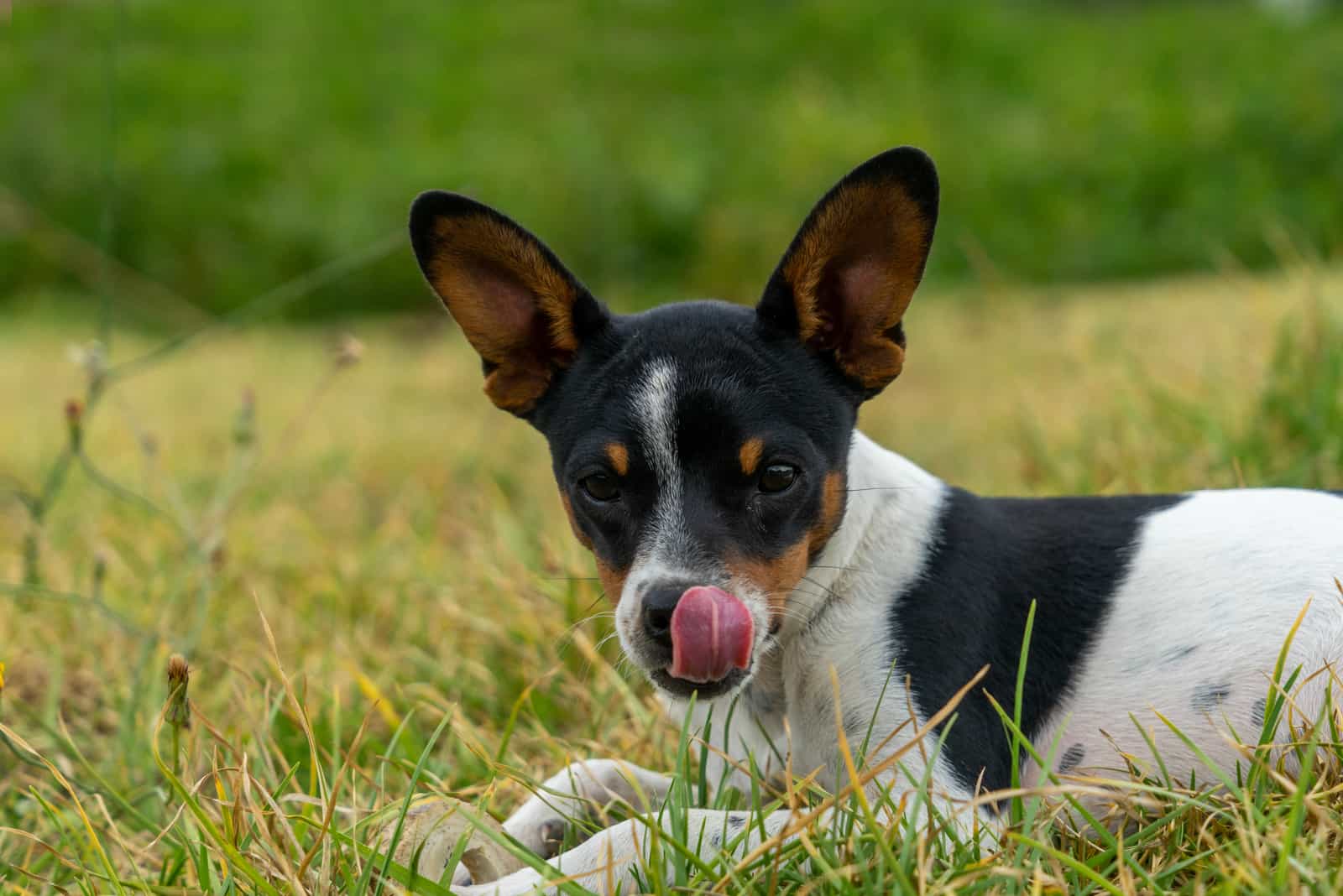
It may be a sign of submission.
This behavior is more noticeable (and more common) when there is more than one dog in a household. As we’ve seen, it’s natural for them to behave this way and is a means of greeting and grooming each other.
It is also a way of showing respect to the dominant dog, and you’ll usually find that the more submissive dog does most of the licking. You’ll often see this when a new puppy joins the home and interacts with older dogs, licking their ears as a sign of respect.
A submissive dog will usually lay on its back, exposing its belly. It will avoid eye contact and sometimes flatten its ears back. You might also notice that its tail wags fast and low when in the presence of a dominant dog (or you, the pack leader!). As well as licking ears, it will also lick around another dog’s muzzle. As dogs can’t communicate with words, they use body language instead.
Again, this natural instinct is mirrored in packs of wild dogs. It’s easy to forget that despite thousands of years of selective breeding, dogs still share 99.95% of their DNA with wolves! These instincts are still buried deep within them and will surface from time to time.
Some dog breeds will assume the role of pack leader unless you assert your authority from the start. If you have more than one dog, then you may find that they sometimes compete for their position as pack members.
There’s a good chance that the most enthusiastic licker will turn its attention to your ears, as well as other dogs!
Why do dogs lick other dogs’ ears? They may be showing submissiveness to their packmates.
Why Do Dogs Lick Each Other’s Ears And Eyes?
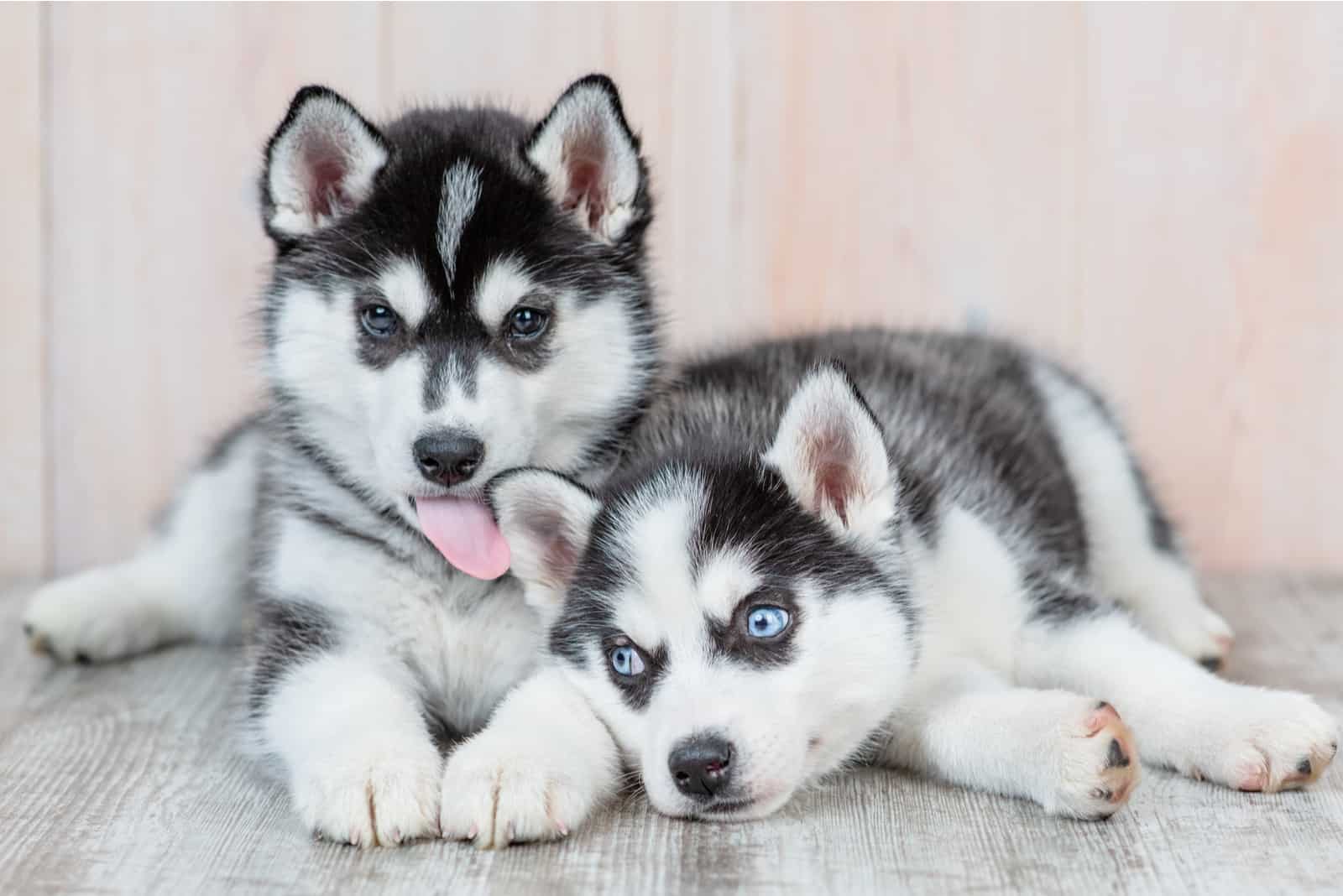
Maybe because they like the taste?
Yes, that’s gross!
All dog owners know just how disgusting our furry friends can be at times. They’ll chew on the most revolting stuff you can think of. And it could be that your perfect pooch likes the taste of earwax.
The thing is, although they have the most amazing sense of smell, their taste buds are not very well developed. Also, they are attracted to stuff that smells bad.
Again, we have our old friend, the gray wolf, to thank for this! A rotting carcass stinks real bad. The smell would have us running in the opposite direction. However, to a wild dog, it’s a means of disguise and protection. Masking their own scent helps them sneak up on prey and avoid any predators in the process. This is possibly why our beloved fur babies like to roll in the most unpleasant substances they can find.
It’s all a matter of perspective and evolution! We have evolved to be repelled by bad smells as they indicate the presence of harmful bacteria. Our limited sense of smell (compared to dogs) is closely linked to our taste buds, and in this area, we are superior to our canine buddies. So, dogs generally love bad smells and are happy to eat gross things because they can’t taste them very well. And this is where earwax comes in.
Dogs’ earwax has a strong, distinctive odor that attracts other dogs like a moth to a flame.
Why do dogs lick other dogs’ ears? Because they love the taste!
Read More: Dog Ear Wax Color Chart
Is It Ok For Dogs To Lick Other Dogs’ Ears?
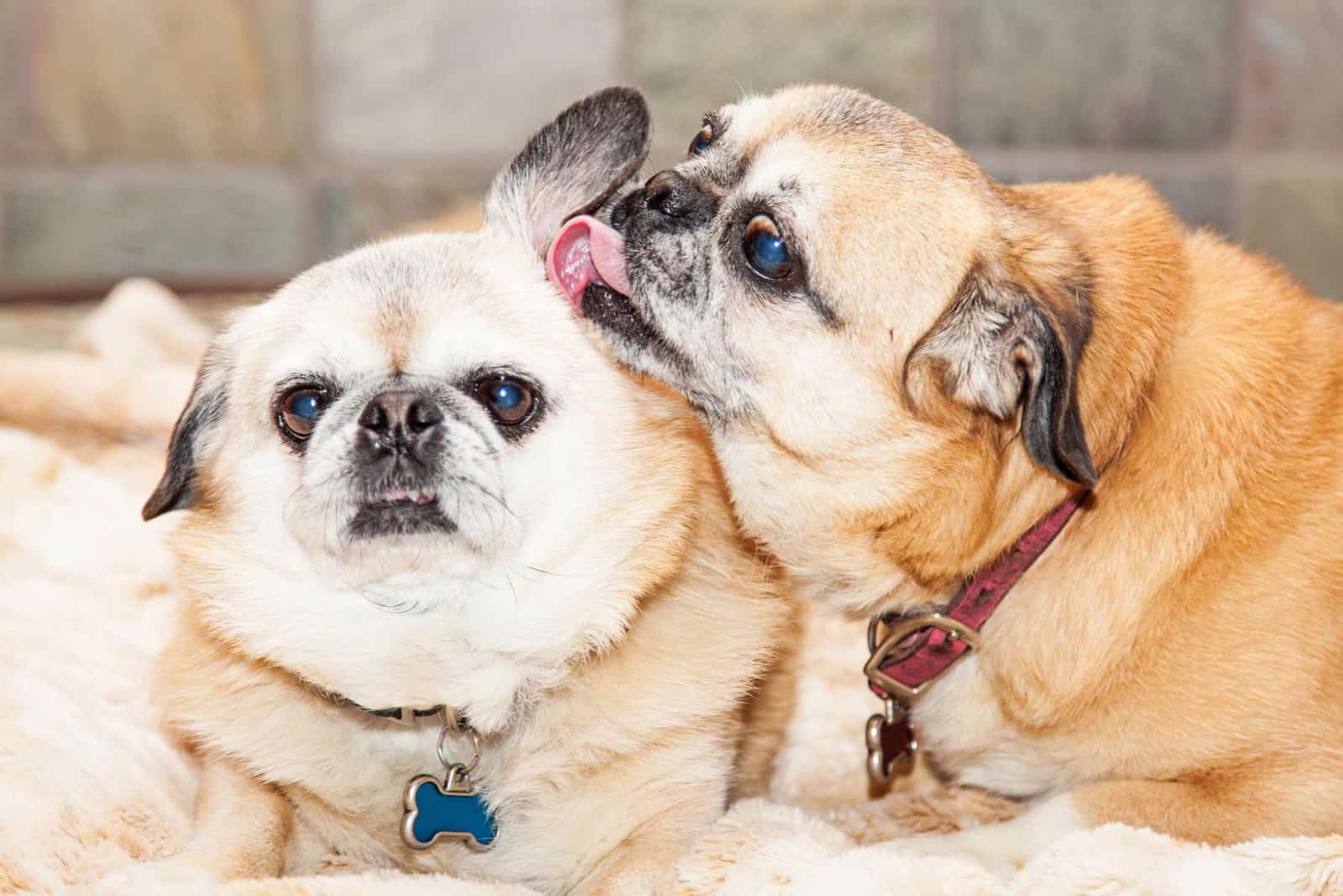
As you might guess, the answer isn’t simple.
The quick answer is yes, it’s perfectly okay and natural for your dog to lick the ears of another dog. If it’s a quick greeting and the action doesn’t last too long, then all is well and good. You might not be keen on the idea that your furry pal likes the taste, but it’s up to you whether to take any steps to discourage this. We’ll look at some ways of doing this further along.
In the meantime, you need to be aware of the following medical issues as possible reasons for ear licking:
Ear Infections
Ear licking can be both a sign of and a cause of ear infections! As we learned, dogs are drawn to bad smells. Infections such as otitis externa often give off a bad odor, which will worsen as the infection progresses through the ear canal. It may well be that one of your dogs has picked up the scent and is licking at his pal’s ear because of this.
Alternatively, excessive licking will deposit bacteria from the dog’s mouth into the ear, where it is warm and moist, providing ideal conditions for them to thrive.
This is why regular ear cleaning should be part of every dog owner’s grooming regime! Severe ear infections can be a nightmare. If it remains undetected for too long, it can cause permanent damage to the dog’s hearing. Aside from this, it is extremely uncomfortable.
If you notice any bad smells coming from your dog’s ears or any excessive ear licking, get your pooches checked out by the vet.
Why do dogs lick other dogs’ ears? It may be a sign of an ear infection!
Read Also: Black Gunk In Dog Ear: What Causes It And How To Solve It
Obsessive Behavior

Does your dog lick other dogs’ ears non-stop, even when they are warned off? If so, it could be a sign of compulsive disorder. And this can cause licking wounds and infections!
It’s also bad news for the licker.
Just as humans suffer from OCD (obsessive-compulsive disorder), dogs can display obsessive behavior. OCD in humans is still a bit of a mystery, as experts are never quite sure whether it is inherited or the result of a chemical imbalance in the brain. It could even be a reaction to life events. In truth, it’s probably a combination of all three.
In dogs, OCD is usually referred to as CCD (canine compulsive disorder) to avoid confusing it with osteochondritis dissecans, which is also known as OCD. This is an inflammatory condition where abnormal cartilage grows at the end of the bone and begins to separate from it. As you can see, it has nothing to do with obsessive behavior!
One of the biggest causes of CCD is anxiety (see below for more details), which is a major problem for dogs. They can be anxious because you left them home alone. They get anxious and fearful during thunderstorms or when loud noises scare them. Rescue dogs or those that have been abused may well suffer from anxiety as they are traumatized and fear it may happen again.
It could even be a simple case of boredom through a lack of mental stimulation.
Other causes include age-related degeneration of the central nervous system, toxins (for example, lead poisoning), and confinement. All of these add to the dog’s anxiety, making obsessive behavior more likely.
Your job is to determine whether the ear licking is a sign of obsessive behavior and then do something about it.
Watch for other indicators, such as:
• Frequent tail chasing, especially if the tip of the tail is damaged and sore.
• Spinning around continuously.
• Self-mutilation (biting at the skin on the paws and legs, causing sore patches).
• Pica (a sudden appetite for non-food substances, including dirt, rocks, wood, feces, etc.)
• Excessive pacing/running up and down, perhaps along the fence in the yard or a wall inside the house.
• Hallucinating (biting at invisible bugs and staring at walls as if watching something).
• Vocalizing (growling, barking, and howling more than usual).
• Sudden uncharacteristic aggression.
If you see a combination of these symptoms, then it’s likely that your pooch is displaying signs of CCD. It’s usually found in adult dogs that have developed socially (between 12 and 24 months), although it can be seen in pups in very rare cases.
It is essential that this condition is diagnosed and treated quickly before the dog’s behavior worsens, so be sure to book a visit to the vet if you suspect that your dog may be suffering from CCD.
You can help your furry friend by ensuring that he has plenty of exercise. Smart dogs with high energy levels need more exercise than other dogs, and this needs to include activities that involve a mental challenge. Things like agility and obstacle courses, herding competitions, dog training, flyball, dock-diving, anything to keep their minds and bodies active!
You could also invest in interactive toys and puzzles that will keep him occupied or fit in some extra walks if you have the time.
Although CCD can be a problem, there are ways to overcome this, so don’t panic!
Why do dogs lick other dogs’ ears? It could be obsessive-compulsive behavior.
Anxiety

We touched on this earlier relating to CCD, but it’s a subject in its own right.
Dogs can be anxious for many reasons:
• Moving to a new home
• Being boarded in kennels
• Being confined
• Abuse and mistreatment
• Being chained in a yard
• Being left alone for long periods
• Being scared by loud noises
• New people or animals
• Traveling long distances
These are a few of the things that can make dogs very anxious and trigger behavioral problems, including ear licking.
Some are easier to overcome than others. For example, if a dog is anxious because they moved to a new home and everything is unfamiliar, then they need time to adjust.
Dogs that have just returned from the kennel where they’ve spent a week or so away from their owners may display anxiety. Again, in time, they will settle down.
Anxiety due to abuse can be a long-term problem and often requires a lot of love and patience, but it’s not impossible to cure.
Where possible, avoid traveling with your dog if it makes them anxious or get a mild sedative from the vet.
Socialization at an early age is the best way to stop your pooch from being anxious when meeting other dogs and people. All reputable breeders start this process within a few days of the pups being born, and with some breeds, it’s an ongoing process.
As for chaining a dog in the yard, this is never a good option as it encourages aggression and increases the risk of attacks and dog bites. Chaining a dog restricts its freedom and stops it from seeking refuge from any perceived dangers. There’s a good chance that the dog will become bored and frustrated, and there’s a real risk of injury from pulling against the chain.
Confining a dog for too long will have the same results as chaining them up. Dogs need freedom of movement and mental stimulation. To deny them this is cruel and unfair.
Separation anxiety is a big deal for a lot of dogs. You need to ensure that your dog is happy and healthy, mentally and physically. Dogs should never be left for too long (ideally never more than four hours at a time). There are ways around this if you do need to leave them, including dog sitters, dog walkers, doggy daycare, and getting friends and family to drop by while you’re out. Desensitize your pooch to your actions and get them used to you not being there.
Dog trainers can help you here, suggesting ways to normalize your absence. It’s a gradual process, but it will work in the end!
If your dog is scared of loud noises (fireworks and thunder are the two main causes), you might feel helpless. Again, some of the best breeders expose their pups to a range of sounds, including fireworks and thunder, to reduce their sensitivity to it when they are older. However, if your best friend is suffering, try to act normal and don’t make a fuss. If you overreact with hugs and kisses, your dog will learn that loud noises mean that they’ll get attention. It will only serve to worsen the problem.
Instead, try to divert their attention away from the sound with a toy or a treat, put on some soothing music, and remain calm at all times. For severe cases, you might need to ask your vet for a sedative to get your dog through the worst.
What has all this to do with ear licking? Well, any of these causes of anxiety might affect your dog’s behavior, and they might start licking other dogs’ ears (and yours!) as a result.
Why do dogs lick other dogs’ ears? They may be anxious about something!
Old Age
Getting old isn’t fun for any of us at times, and for dogs, it’s much worse because they get older sooner than we do.
Aside from their stiff and sore joints, old dogs often suffer from cognitive dysfunction, which is essentially dog dementia. As they age, less oxygen is received in the brain, which impairs its function, sometimes leading to dementia. They start to forget basic things, such as potty training and will resort to repetitive behavior, including licking. It’s never easy to watch your beloved pooch go through this, but your vet will guide you through this period with advice and any necessary medication.
Why do dogs lick other dogs’ ears? Perhaps they’re just getting old.
Why Do Female Dogs Lick Other Dog’s Ears?
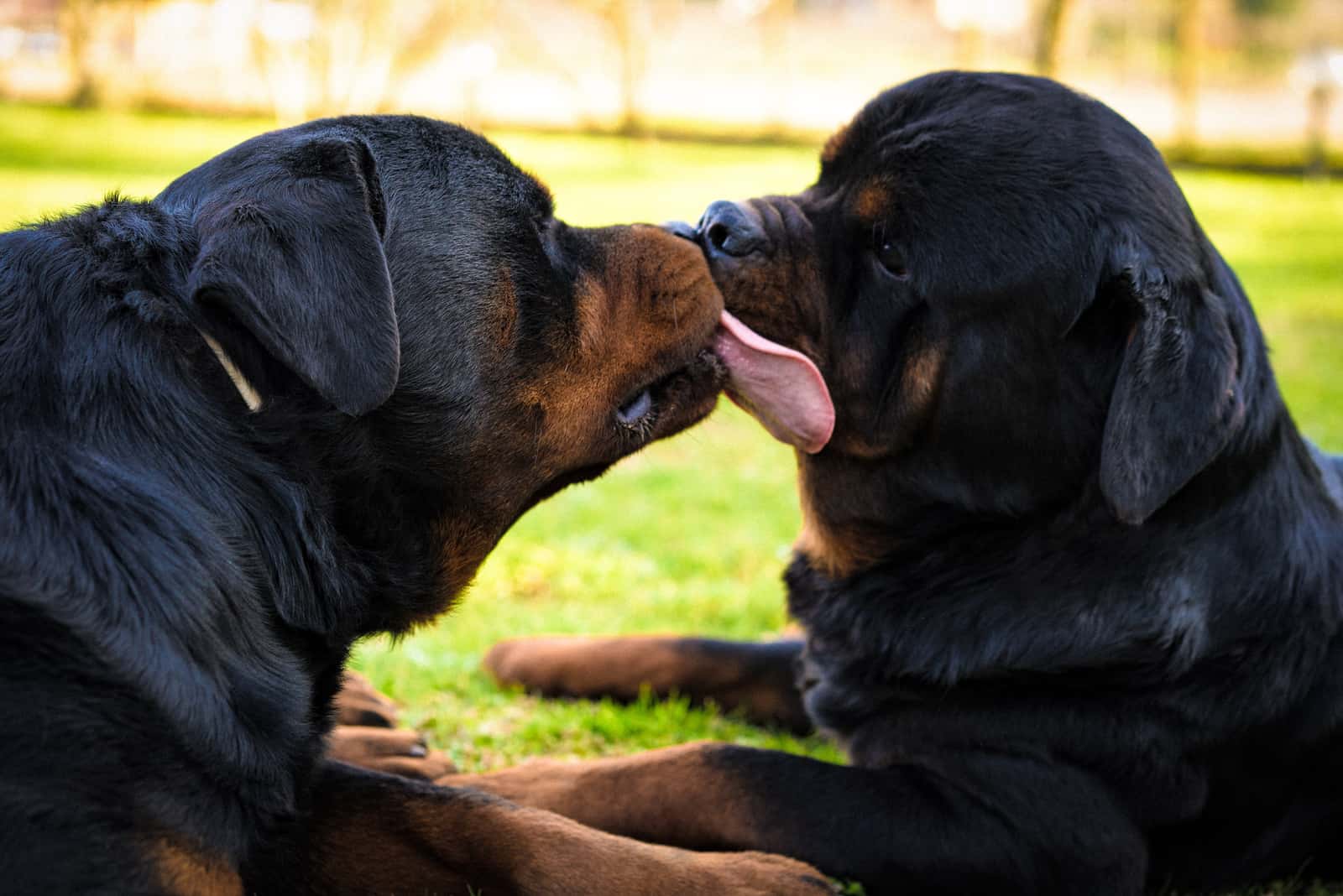
Probably because they are being moms.
Female dogs often have strong mothering instincts. Licking is a natural part of looking after pups, stimulating the blood flow, starting the breath reflex immediately after birth, and keeping them clean when they pee and poop.
It also boosts the production of feel-good hormones that strengthen the bond between mother and pup. Her youngsters find it comforting, and the mother gets something out of it, so it’s a win-win! Although she licks the pups all over, she may pay special attention to the ears as a sign of affection.
This behavior can continue long after the pups have left the litter, and the mother dog will transfer her attention and affection elsewhere. Other dogs in the home are an obvious target, but she will also behave the same toward other pets and family members.
She will focus on the ears out of practicality – there is no need for her to clean the other dog like she did her pups – and also because she is showing affection rather than indulging in a proper grooming session.
Why do dogs lick other dogs’ ears? Because they are mother dogs who see everyone as their puppy!
What We Have Learned About Ear Licking
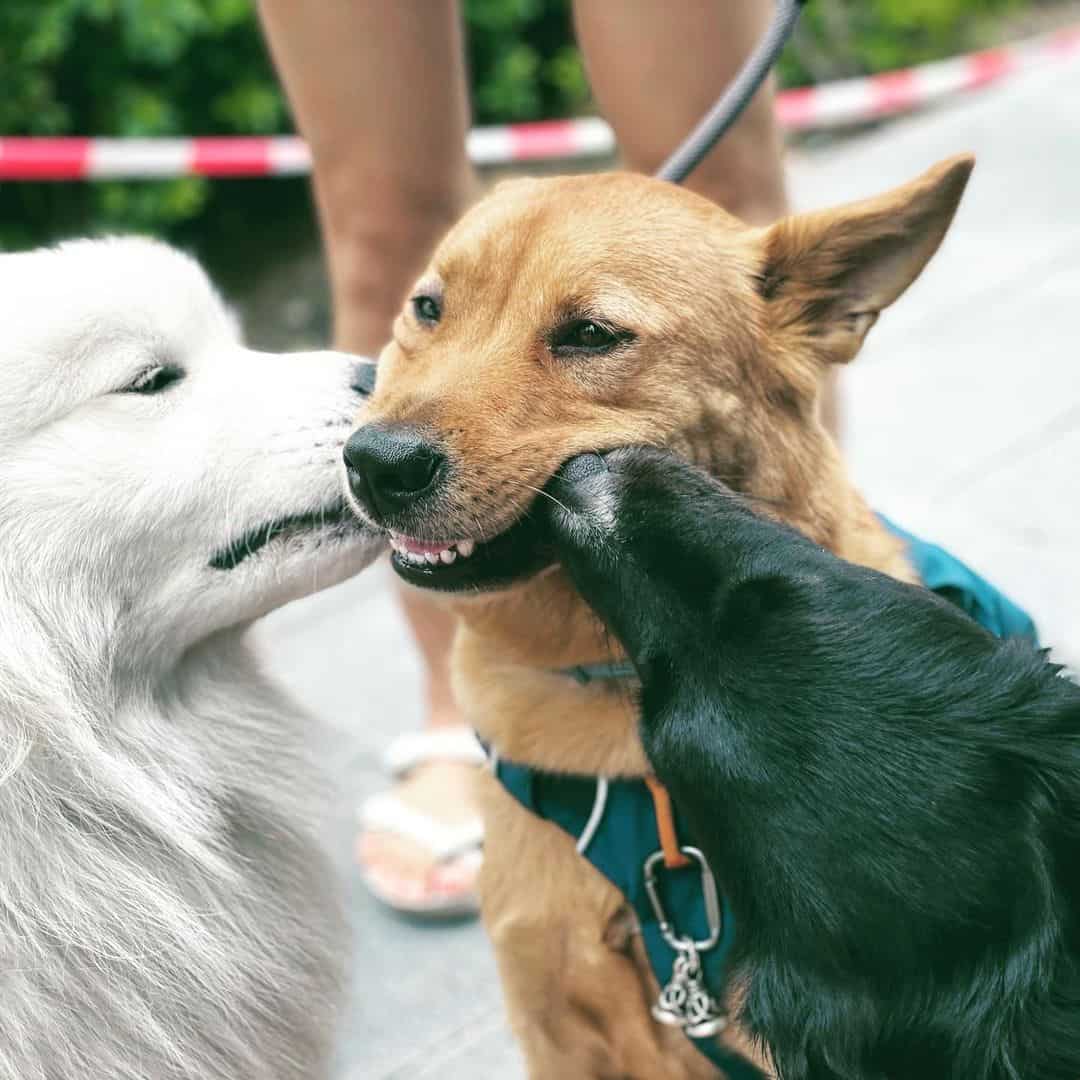
Photo from: @kiwimomo_bambi
We’ve learned that dogs lick ears. It’s just something they do and one of the many reasons why we love them.
But is it ok to let them do it?
We learned that ear licking is a dog’s way of saying hello. Well, that’s fine. There’s no problem with this at all, as long as it’s not prolonged and doesn’t happen too often throughout the day.
We also discovered that dogs lick other dogs’ ears as a sign of submission. They sense that they have a lower position in the pack, and they are showing respect to a pack member that’s above them. Again, there isn’t really a problem here, as long as it’s not obsessive and doesn’t lead to fights (the dog being licked can become frustrated after a while!).
As disgusting as it sounds to us, dogs might just like the taste of earwax. There are all sorts of things mixed up in it, such as pollen, dirt, dead skin cells, and bacteria. So, it’s wise to put a stop to this habit as soon as possible.
Distraction tactics are the most effective, using treats, interactive toys, petting, or anything that will divert your dog’s attention away from ear licking.
Of course, they might be attracted to your other dog’s ears because of an infection (which they might have caused!), so be sure to check this out. As well as distracting your dog, you might have to teach them a ‘leave it’ command to make them stop.
This is good for general use if you feel that your dog is paying too much attention to another dog’s ears. A gentle command should make them stop when you say so.
Excessive ear licking might be a sign of obsessive behavior. Canine compulsive disorder is caused by medical or psychological problems, usually related to pain, trauma, or anxiety. Extreme cases of CCD can be distressing, both for the dog and its owners. It is essential that you seek treatment for this condition immediately to ease your dog’s suffering and for the sake of your own peace of mind.
Anxiety doesn’t always lead to CCD, but it can have a serious impact on your dog’s behavior in other ways. Ear licking might not seem too bad a problem, and, relatively speaking, it isn’t.
However, it could indicate that your dog isn’t happy, and as pet parents, it’s our job to find out why. Watch out for any other signs and symptoms, such as frequent barking, howling, destructive behavior, or aggression. If you do have another pet (especially if it’s a dog) in the house, then separation anxiety shouldn’t be too much of an issue as they can keep each other company. Even so, this isn’t always the case!
There’s a good chance that the ear licking habit might get worse when you’re not around to supervise. The dogs will take comfort from the other’s presence and show affection this way, and there’s nothing you can do about it if you’re not there.
The good news is that separation anxiety can be overcome with a bit of effort. As we stated above, you need to train your dogs to accept that it’s normal for you to be absent at times. Dogs that suffer from separation anxiety basically have a panic attack when you’re not around. They don’t understand what’s happening and will indulge in uncharacteristically bad or unusual behavior. This includes being destructive, peeing and pooping in the house, and barking and howling excessively.
Compared to these, ear licking is nothing! However, it could still indicate that something is wrong, and as we’ve seen, it can lead to lick wounds and infections. For all these reasons, it’s a good idea to look into the causes of ear licking and put a stop to it.
Aside from anxiety, we discovered that old age can lead to dogs licking other dogs’ ears. This can become a habit as the dog’s cognitive functions are impaired.
Finally, we learned that female dogs will lick other dogs’ ears, as well as yours or any other pets in the home, because they are acting like a mother would toward her pups.
So, ear licking isn’t necessarily a bad thing. It’s a greeting, a sign of affection, a sign of submission, and a way of signaling that there’s something wrong. Dogs like doing this because hormones are released, but also because they are drawn to bad smells, and they may even like the taste. Yuck.
In the end, as pet parents, we need to watch our pooches closely and observe their behavior. Occasional ear licking, if it only lasts a few moments, is fine. If you find that it goes on for much longer and happens too frequently, then feel free to use this guide to find a solution.
Above all, don’t worry! You’ll get this problem licked in no time.
Related Articles:
Signs That A Male Dog Wants To Mate
Why Do Dogs Bite Each Other’s Necks? Dog Neck Biting Behavior Explained
